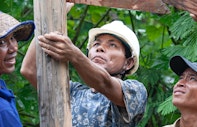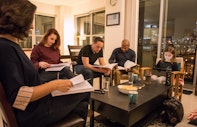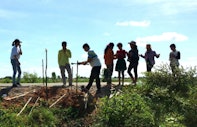What Bahá’ís Believe
Essential Relationships
The Individual and Society
Quotations
- What Bahá’ís Believe
- Overview
- Bahá’u’lláh and His Covenant
- The Life of the Spirit
- God and His Creation
- Essential Relationships
- Universal Peace
- What Bahá’ís Do
An introductory selection of extracts from the Bahá’í writings on the subject of the relationship between the individual and society.
O SON OF SPIRIT! The best beloved of all things in My sight is Justice; turn not away therefrom if thou desirest Me, and neglect it not that I may confide in thee. By its aid thou shalt see with thine own eyes and not through the eyes of others, and shalt know of thine own knowledge and not through the knowledge of thy neighbor. Ponder this in thy heart; how it behooveth thee to be. Verily justice is My gift to thee and the sign of My loving-kindness. Set it then before thine eyes.
Knowledge is as wings to man’s life, and a ladder for his ascent. Its acquisition is incumbent upon everyone. The knowledge of such sciences, however, should be acquired as can profit the peoples of the earth, and not those which begin with words and end with words. Great indeed is the claim of scientists and craftsmen on the peoples of the world.
And the honor and distinction of the individual consist in this, that he among all the world ’s multitudes should become a source of social good. Is any larger bounty conceivable than this, that an individual, looking within himself, should find that by the confirming grace of God he has become the cause of peace and well-being, of happiness and advantage to his fellow men? No, by the one true God, there is no greater bliss, no more complete delight.
God has given us eyes, that we may look about us at the world, and lay hold of whatsoever will further civilization and the arts of living. He has given us ears, that we may hear and profit by the wisdom of scholars and philosophers and arise to promote and practice it. Senses and faculties have been bestowed upon us, to be devoted to the service of the general good; so that we, distinguished above all other forms of life for perceptiveness and reason, should labor at all times and along all lines, whether the occasion be great or small, ordinary or extraordinary, until all mankind are safely gathered into the impregnable stronghold of knowledge. We should continually be establishing new bases for human happiness and creating and promoting new instrumentalities toward this end. How excellent, how honorable is man if he arises to fulfill his responsibilities; how wretched and contemptible, if he shuts his eyes to the welfare of society and wastes his precious life in pursuing his own selfish interests and personal advantages. Supreme happiness is man’s, and he beholds the signs of God in the world and in the human soul, if he urges on the steed of high endeavor in the arena of civilization and justice.
We cannot segregate the human heart from the environment outside us and say that once one of these is reformed everything will be improved. Man is organic with the world. His inner life moulds the environment and is itself also deeply affected by it. The one acts upon the other and every abiding change in the life of man is the result of these mutual reactions.
There are certain fundamental concepts that all should bear in mind. One is the centrality of knowledge to social existence. The perpetuation of ignorance is a most grievous form of oppression; it reinforces the many walls of prejudice that stand as barriers to the realization of the oneness of humankind, at once the goal and operating principle of Bahá’u’lláh’s Revelation. Access to knowledge is the right of every human being, and participation in its generation, application and diffusion a responsibility that all must shoulder in the great enterprise of building a prosperous world civilization—each individual according to his or her talents and abilities. Justice demands universal participation.
Regarding reciprocity and cooperation, each member of the body politic should live in the utmost comfort and welfare because each individual member of humanity is a member of the body politic, and if one member is in distress or is afflicted with some disease, all the other members must necessarily suffer. For example, a member of the human organism is the eye. If the eye should be affected, that affliction would affect the whole nervous system. Hence, if a member of the body politic becomes afflicted, in reality, from the standpoint of sympathetic connection, all will share that affliction since this [one afflicted] is a member of the group of members, a part of the whole. Is it possible for one member or part to be in distress and the other members to be at ease? It is impossible! Hence, God has desired that in the body politic of humanity each one shall enjoy perfect welfare and comfort.
The world of politics is like the world of man; he is seed at first, and then passes by degrees to the condition of embryo and foetus, acquiring a bone structure, being clothed with flesh, taking on his own special form, until at last he reaches the plane where he can befittingly fulfill the words: “the most excellent of Makers.” Just as this is a requirement of creation and is based on the universal Wisdom, the political world in the same way cannot instantaneously evolve from the nadir of defectiveness to the zenith of rightness and perfection. Rather, qualified individuals must strive by day and by night, using all those means which will conduce to progress, until the government and the people develop along every line from day to day and even from moment to moment.
Explore more about the Individual and Society…
You can find readings, essays, and resource materials on this subject in the Articles and Resources section.







